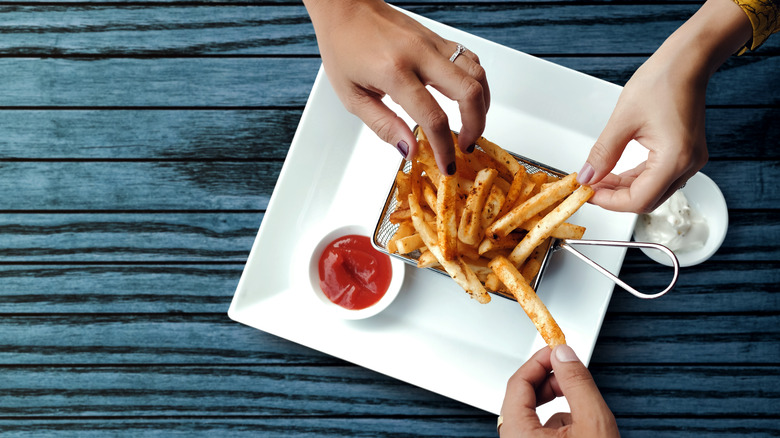The Unexpected Reason Why Cheat Meals Are Actually A Bad Idea
It seems there's no shortage of dietary strategies out there. According to Healthline, intermittent fasting, plant-based diets, low-carb eating plans, and ketogenic diets are among the most sustainable plans, offering a bit of flexibility in what you get to eat. Still, there is no one approach to eating that works for every person. Some eating plans operate on the other end of the spectrum and guarantee to do some real bodily harm, while also sparking cravings (via BestLife).
If you find yourself following a diet that sparks cravings big enough to warrant a cheat meal, you might want to reconsider your entire plan. Rebecca Washuta, a licensed dietitian nutritionist and Coach Project Manager at Noom, urges anyone who feels like they have to cheat on their diet to change their approach to healthy eating. To understand the consequences of cheat meals, Washuta first defined what these foods look like. "For most people, 'cheat meals' consist of high-calorie foods that they love but consider off-limits," Washuta told Mashed. In theory, the idea of a 'cheat meal' seems like it may be helpful for staying on track, but this couldn't be further from the truth."
"If you're feeling like you need a 'cheat meal,' this is a sure sign that your food habits are overly restrictive," Washuta continued. "These types of approaches to food and weight loss usually aren't sustainable and can result in regaining the weight you've lost."
The easiest way to set back your wellness goals
The very idea of cheat meals can undo any diet. "By labeling foods as 'bad' and only allowing yourself to enjoy them on special days or at certain intervals (i.e., a weekly cheat meal) you're not setting yourself up for success," Rebecca Washuta explained. "This type of restriction can lead to feeling deprived and ultimately cause you to overeat. Moreover, because you've labeled these foods as 'bad,' when you do eat them, you're likely to have feelings of guilt or shame, which can spiral into a binge/restrict cycle."
Embracing your cravings can actually do more for your health than denying them. "At Noom, we recommend that you 'lose the label,' meaning that you stop categorizing foods as off-limits," Washuta continued. Washuta suggests embracing your cravings and learning to mindfully eat your favorite foods. With that approach, there's no need for cheat meals. "Instead, you can find a personalized balance with all foods and still reach your wellness goals." With a bit of know-how — by embracing cravings and reexamining your 'cheat days' — you can do a world of good for your body.
If you are struggling with an eating disorder, or know someone who is, help is available. Visit the National Eating Disorders Association website or contact NEDA's Live Helpline at 1-800-931-2237. You can also receive 24/7 Crisis Support via text (send NEDA to 741-741).

